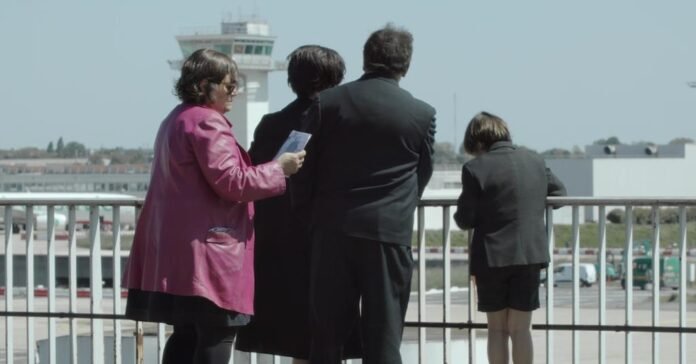Dir: Dominique Cabrera. France. 2024. 104mins
Although it’s basically composed of images as an alternative of shifting photographs, Chris Marker’s science fiction brief La Jetée (1962) continues to enthrall filmmakers and cinephiles alike. Living proof: La Jetée, The Fifth Shot, a captivating but in addition considerably rambling new documentary function about only one shot —or fairly {photograph}— within the brief. Issues kick off when an aged French man appears to recognise himself as a toddler within the titular fifth shot, which units in movement a meandering investigation by director Dominique Cabrera (Corniche Kennedy).
Most interesting for cinephiles on a conceptual stage.
La Jetée, The Fifth Shot performs in DOK Leipzig competitors; maybe not coincidentally the pageant that awarded Marker’s 1963 opus Le Joli Mai, which was shot similtaneously La Jetée and which can be abundantly excerpted right here. Cinematheques and cinephile broadcasters could need to give this a glance.
While visiting the Cinémathèque Française along with his grownup daughter Camille, Jean-Henri thinks he recognises himself because the little boy standing on the railing of the jetty — the well-known Jetée of the title — at Orly Airport close to the start of Marker’s brief. Jean-Henri comes from a household of so-called pieds-noirs, folks of European descent who had been born in Algeria in the course of the 130-odd years of French rule. Many moved to France across the time Algeria turned impartial in 1962, though some had by no means set foot on this “motherland” (as was the case for Jean-Henri’s household). As is defined within the movie, these migrants would come to Orly to observe different flights from Algeria arrive, within the hope they’d recognise somebody from residence.
Because it occurs, Jean-Henri comes from a big household of image-makers and photographers and his cousin, Dominique Cabrera, is a filmmaker who directs this documentary in regards to the investigation into an especially unlikely coincidence. Cabrera’s first intuition is to try to work out if Jean-Henri is actually the boy within the grainy black-and-white shot. We see him standing subsequent to his mother and father who, like him, are staring forward, little doubt a aircraft coming in. However with all of their backs turned to Marker’s digital camera, it’s onerous to establish them with 100% accuracy. A number of different members of the family in addition to photographic proof from private archives are introduced in to try to construct a case.
Many of the motion occurs in what appears like a dimly-lit modifying suite, the place researchers and editors are at work whereas Cabrera talks together with her topics. The conversations are casual, actually because she’s talking to members of the family however, even so, the best way wherein the director lays out data shouldn’t be at all times instantly understandable. But a throughline of fascinated about photographs and their that means, in regards to the doubles which might be created when capturing actuality, does maintain issues intriguing.
Certainly, the movie is most interesting for cinephiles on a conceptual stage. One of many themes of the unique La Jetée, for instance, is time journey. Cabrera’s movie, made 60-odd years after La Jetée however with individuals who performed a job within the brief a lot youthful variations of themselves, can’t assist however mess around slightly with the idea too. And apart from precise clips from different Marker movies, there are plenty of winky inclusions that consult with the enduring filmmaker’s oeuvre. The household historical past, nonetheless, appears to be extra fascinating for the characters than for viewers. And that is doubly the case for international audiences who aren’t not less than slightly bit conscious of French colonial historical past.
Enhancing, courtesy of Sophie Brunet and Dominique Barbier, may have additionally used a bit extra rigour, because the movie does outstay its welcome at 104 minutes — nearly 4 occasions the size of Marker’s brief. Because the movie was co-produced by Franco-German broadcaster Arte, maybe a shorter model for tv is already within the works.
Manufacturing firms: Advert Libitum
Worldwide gross sales: Edmee Doroszlaï libitumad@wanadoo.fr
Producers: Edmee Doroszlaï
Cinematography: Karine Aulnette
Enhancing: Sophie Brunet, Dominique Barbier
Music: Beatrice Thiriet, Oscar Turbant, Elise Bertrand
